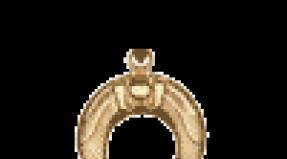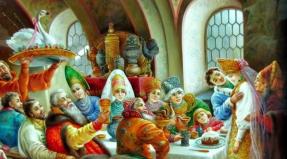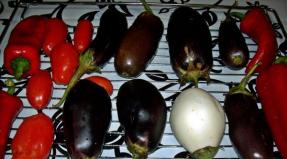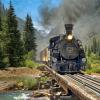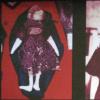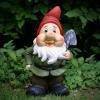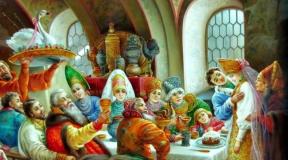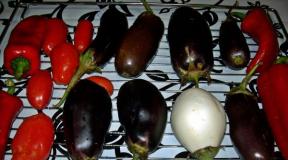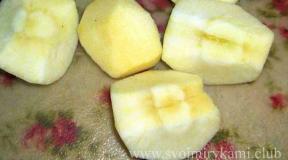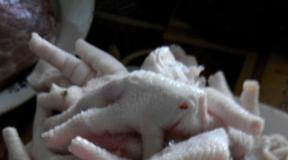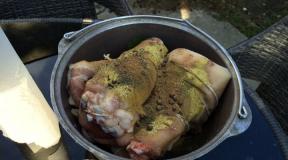How to explain why the story is called “Bezhin Meadow”? What other works have you read that are named after the events that take place in them? “Bezhin Meadow” main characters Description of the heroes Bezhin Meadow Vanya
How to explain why the story is called “Bezhin Meadow”? What other works have you read that are named after the events that take place in them?
The story is called “Bezhin Meadow” after the place where its events took place. Bezhin Meadow is located thirteen kilometers from the estate of I. S. Turgenev Spasskoye-Lutovinovo. In addition to small stories named after the place where the events described in them took place, there are large works, for example, the epic novel “Quiet Don” by M. A. Sholokhov.
What signs of good summer weather that the Russian farmer knew does Turgenev point out?
The story “Bezhin Meadow” begins with a very detailed description of all the signs of persistent good weather in the summer in central Russia. This description is not only accurate, but also beautiful. Together with the author, we observe how the sky changes above us, and we learn to connect the beauty of living nature with the phenomena that this beauty helps to understand. Before us is a unique weather forecast that a Russian peasant of the 19th century knew how to make.
We read at the beginning of the story:
“From early morning the sky is clear; the morning dawn does not blaze with fire: it spreads with a gentle blush...”;
“The sun is not fiery, not hot, as during a sultry drought, not dull purple, as before a storm, but bright and welcomingly radiant...”;
“The upper, thin edge of the stretched cloud will sparkle with snakes...”;
“But then the playing rays poured out again, and the mighty luminary rose cheerfully and majestically, as if taking off...”
Try to describe the state of summer nature: morning, afternoon, evening.
We just remembered how the morning is described in the story. Now let's watch the evening: “By evening these clouds disappear; the last of them, blackish and vague, like smoke, lie in pink clouds opposite the setting sun; at the place where it set as calmly as it calmly rose into the sky, a scarlet glow stands for a short time over the darkened earth, and, quietly blinking, like a carefully carried candle, the evening star glows on it.”
You can take another fragment, but each description brings to us both the beauty of nature and an accurate description of the signs of summer weather familiar to the peasants.
Basic figurative means (personification and metaphors)
Morning awakening picture |
|
In personifications | In metaphors |
“A fresh stream ran across my face”; “The dawn has not yet blushed anywhere”; “and the liquid early breeze has already begun to wander and flutter over the earth”; “everything moved, woke up, sang, made noise, spoke” | “The pale gray sky became lighter, colder, bluer; the stars blinked with faint light and then disappeared, the earth became damp, the leaves became foggy”; “flowed around me... first scarlet, then red, golden streams of young, hot light”; “Large drops of dew began to glow everywhere like radiant diamonds” |
Comparison | Metaphor | Personification | Epithet |
"The night was approaching and | “Darkness rose from everywhere and even poured from above”; | “At the bottom of it (the ravine) | “The night bird timidly dived to the side”; |
Ghosts of the night | Pictures of the night | Boys' impressions |
Visual images | “The dark, clear sky stood solemnly and immensely high above us with all its mysterious splendor”; “I looked around: the night stood solemnly and royally”; “Countless golden stars seemed to flow quietly, twinkling in competition, in the direction of the Milky Way...” | “The picture was wonderful!” “Look, look, guys,” Vanya’s childish voice suddenly rang out, “look at God’s stars, the bees are swarming!” “The eyes of all the boys rose to the sky and did not fall soon.” |
“Almost no noise was heard all around... Only occasionally in a nearby river a large fish would splash with sudden sonority, and the coastal reeds would rustle faintly, barely shaken by the oncoming wave... only the lights crackled quietly.” | ||
Mysterious sounds | “Suddenly, somewhere in the distance, a long ringing, almost moaning sound was heard...”; “It seemed as if someone else responded to him in the forest with a thin, sharp laugh, and a weak, hissing whistle rushed along the river”; “a strange, sharp, painful cry suddenly rang out twice in a row over the river and a few moments later was repeated further” | “The boys looked at each other and shuddered”; “Kostya shuddered. - What is this? “It’s a heron screaming,” Pavel calmly objected.” |
“My chest felt sweetly ashamed, inhaling that special, languid and fresh smell - the smell of a Russian summer night”; in the morning |
The meaning of nature in the story “Bezhin Meadow”
Descriptions of morning, afternoon, evening, night
I Description of landscape sketches
II The sound side of the pictures
Group I | Group II | III group |
Dark gray sky; drenched in shadow; the pond barely smokes; the edge of the sky turns red; the air brightens, the road becomes clearer; the sky is clearing; the clouds are turning white; the fields are green; in the huts the splinters burn with red fire; the dawn flares up, golden stripes stretch across the sky; steam swirls in the ravines; watery green meadows; a damp sheen in the air; a green line marks the footprints across the dewy, whitened grass, etc. | The restrained, indistinct whisper of the night is heard; every sound seems to stand in frozen air, stands and does not pass; the cart rattled loudly; sparrows chirp; Sleepy voices are heard outside the gates; the larks sing loudly; lapwings fly screaming; the sonorous clang of the scythe is heard behind us, etc. | The damp wind comes in a light wave; you are a little cold, you are dozing; your heart will flutter like a bird; fresh, fun, loving; how freely the chest breathes, how vigorously the limbs move, how the whole person grows stronger, embraced by the fresh breath of spring; If you part the wet bush, you will be showered with the accumulated warm smell of the night; the whole air is filled with the fresh bitterness of wormwood, honey, buckwheat and “porridge”, etc. |
Describe the hunter's first meeting with peasant children from neighboring villages. Like the author, give a general description of the boys.
“Children’s ringing voices were heard around the lights, two or three boys rose from the ground... These... were peasant children from neighboring villages...”; “There were five boys: Fedya, Pavlusha, Ilyusha, Kostya and Vanya.” The boys set out at night and were busy talking until the hunter appeared. They were from seven to fourteen years old. All the guys were from families of different incomes, and therefore they differed not only in their clothes, but also in their demeanor. But the boys were friendly with each other and talked with interest; their conversation attracted the hunter’s attention.
Create a portrait of one of the boys of your choice.
Most often, students choose to describe Pavlusha as the bravest and most determined boy. But some girls choose Ilyusha because he knew a lot of scary stories and they can be included in the story, which makes the story more interesting. Those who want to give a shorter answer choose Vanya’s portrait.
The story about any boy should be short. We propose to build it according to the general plan.
- The boy's appearance.
- His role among friends around the fire.
- The stories they told.
- Attitude to other people's stories.
- An idea of the boy's character.
- The author's attitude towards this hero.
If you choose Pavlush for the story, then you must decide how you explain the reason for his death. Most often they talk about an absurd accident, but one cannot ignore that Pavlusha was very brave and took an unjustified risk, and this could have ruined him.
The story very briefly and clearly gives a portrait of each of the boys and tells their stories in detail. So it’s not difficult to select the necessary sentences from the text and combine them into one story according to the above plan.
Illustrations by A.F. Pakhomov * for the story by I.S. Turgenev
"Bezhin Meadow"
Fedya
Fedya was one of the ringleaders, the son of a wealthy peasant. Fedya, you would give him fourteen years. He was a slender boy, with beautiful and delicate, slightly small features, curly blond hair, light eyes and a constant half-cheerful, half-absent-minded smile. He behaves with restraint, a little condescendingly - the position obliges him. He belonged, by all accounts, to a rich family and went out into the field not out of necessity, but just for fun. He was wearing a motley cotton shirt with a yellow border; a small new army jacket, worn saddle-back, barely rested on his narrow shoulders; a comb hung from a blue belt. His boots with low tops were just like his boots - not his father's.
Fedya is a slender boy with beautiful and thin, slightly small features, curly blond hair and a constant half-cheerful, half-absent-minded smile.
He was wearing a motley cotton shirt with a yellow border, a small new army jacket, put on saddled, barely rested on his narrow shoulders; A comb hung from a blue belt. His boots with low tops were exactly his boots - not his father's.
Fedya lay leaning on his elbow and spreading the tails of his overcoat. is patronizing towards other boys. Fedya is patronizing towards other boys.
He listened carefully to all the boys, but showed with all his appearance that he did not believe in their stories. It is felt that he received a good education at home and therefore he is not characterized by the naivety that is inherent in other children.
The second boy Pavlushi, the hair was tousled, black, the eyes were gray, the cheekbones were wide, the face was pale, pockmarked, the mouth was large, but correct, the whole head was huge, as they say, the size of a beer pot, the body was squat, awkward. The guy was unprepossessing - needless to say! - but still I liked him: he looked very smart and direct, and there was strength in his voice. He could not flaunt his clothes: they all consisted of a simple homespun shirt and patched ports.
Pavlusha watched the potatoes and, kneeling, poked a sliver of wood into the boiling water.
Pavlusha tells three stories: about heavenly foresight, about Trishka, about Vasya’s voice.
Pavlusha is distinguished by her efficiency and courage. He was not afraid to go and see why the dogs were worried.
Ilyusha- an ugly but neat boy. His face was hook-nosed, elongated, slightly blind, and expressed a kind of dull, painful solicitude. Yellow, almost white hair stuck out in sharp braids from under a low felt cap, which he pulled over his ears every now and then with both hands. He was wearing new bast shoes and onuchi; a thick rope, twisted three times around the waist, carefully tied his neat black scroll. Both he and Pavlusha looked no more than twelve years old.
Ilyusha tells 7 stories: a story about a brownie that happened to him and his comrades, about a werewolf, about the late master Ivan Ivanovich, about fortune telling on his parents' Saturday, about Trishka the Antichist, about a peasant and a goblin, and about a merman. Ilyusha differs from all the village boys in his ability to captivatingly tell scary stories.
In description Bones, a boy of about ten years old, the author notes a thoughtful and sad look. His whole face was small, thin, freckled, pointed downwards, like a squirrel's; his lips could barely be distinguished, but a strange impression was made by his large, black eyes, shining with a liquid brilliance; they seemed to want to say something, but he had no words. He was short, frail in build, and dressed rather poorly.
Kostya lowered his head a little and looked somewhere into the distance. He is thoughtful and sad.
Kostya retells the story about the mermaid, which he heard from his father, about the voice from the boom and about the boy Vasya from his village
Portrait characteristics Vani the author does not give, he only writes that he was only seven years old. He lay and did not move under his matting.
Vanya is timid and silent, he does not tell any stories because he is small, but he looks at the sky and admires God's stars.
Vasya is a very kind boy. He speaks fondly of his sister.
How are children's stories related to the night landscape?
All the scary stories in the story are selected in such a way that they are in harmony with both the night landscape and the excitement of children thirsting for something extraordinary. The narrator himself seems to join their perception of the environment.
What did I. S. Turgenev want to convey with the images of boys around the fire?
Turgenev showed their natural talent and poetry. Each of them has their own style of storytelling, but they all speak simply, accurately, and figuratively. The boys tell scary stories about evil forces, but they believe in the victory of good.
However, the boys' stories testify not only to the richness of their imagination, but also to the fact that they are captive of superstitions born of darkness and the powerless position of the people.
“Bezhin Meadow” is one of the most poetic stories in “Notes of a Hunter.” It awakens in a person the ability to perceive beauty, reveals the beauty of both Russian nature and the seemingly unremarkable heroes who grew up among it.
Which character did you like the most? Which boy do you think the author likes best? Try to prove it with text.
When discussing those boys whom we see around the fire, the sympathies of the majority are on the side of Pavlusha. And his advantages are easy to prove: he is brave, decisive, and less superstitious than his comrades. Therefore, each of his stories about mysterious events is distinguished by the desire to understand the reasons for what is happening, and not the desire to look for a terrible secret in these events. But not only the majority of readers like Pavlusha, I. S. Turgenev himself speaks of his sympathy for him on the pages of the story: “The little guy was unprepossessing, - needless to say! “But still, I liked him: he looked very smart and straightforward, and there was strength in his voice.”
Turgenev called the stories told by the boys, first tales, then legends, then beliefs. Modern scientists call them tales. Explain what each of these words means. Which one more accurately conveys the features of children's stories?
Tales are usually called false stories of people who are trying to deceive their listeners. Most often this word is used to disparage someone's untruthful account of events. Tradition is most often called an oral story about historical events or figures that is passed down from generation to generation. This genre of folklore is often replaced by the word legend, which also tells about long-past events. The word belief has a similar meaning. The word blade of grass was created recently and is used to describe works of folklore, which deal with events in which the storytellers themselves or people close to them participated.
Retell one of the stories close to the text. Try to explain how it could have appeared.
You can use the very first tale that the hunter heard from Ilyusha. This is the story of what happened at Rolna, a tiny paper mill where the boys worked. Having stayed overnight at their workplace, they just started telling all sorts of scary stories and remembered about the brownie, when they immediately heard someone’s steps. They were afraid primarily because they were sure that the brownie could be heard, but not seen. And footsteps and fussing above their heads were clearly heard, and someone also began to go down the stairs... And although the door to the room where they were all lying opened and they didn’t see anyone there, this did not reassure them. Then suddenly someone “coughs, choke, like some kind of sheep...”.
In every class there are students who immediately talk about a sheep that probably accidentally wandered into a paper factory and began to wander along its stairs, and the frightened children mistook the sounds they heard for the tricks of a brownie.
Thus, everyday observations can explain each of the stories told around the fire. What is important is not that the fears most often turned out to be the fruit of fiction, but how inventive the storytellers were and how they sought to understand the causes of a variety of incidents.
Compare the stories of Pavlusha and Ilyusha about the end of the world. How do boys' ideas differ? Choose one story to retell and explain your choice.
The stories about the same episode - about a solar eclipse (the end of the world) - are sharply different from each other by Pavlusha and Ilyusha. Pavlusha tells it very laconically, briefly, he sees the funny side in the events that caused the end of the world: the cowardice of his fellow villagers, the inability to understand what is happening. Ilyusha, on the contrary, is full of delight at the unusual event, and no jokes come to his mind. He is even inclined to scare the listeners a little and claims that “he (Trishka) will come when the last times come.”
When choosing one story for your retelling, you need to explain why the choice was made. Usually boys choose Pavlushi's story for its laconicism and for its cheerful smile at what scares others. Girls often sympathize with Ilyusha, and some even tend to empathize with his fears.
How can you explain the ending of the story “Bezhin Meadow”?
The ending of the story “Bezhin Meadow” is simple and natural. The hunter woke up before the boys, who were sleeping by the fire, and went to his house. This is the ending of many stories in the collection “Notes of a Hunter” by I. S. Turgenev, which includes “Bezhin Meadow”. In each of them, the hunter leaves the place where some events happened to him and goes home. But at the end of the story “Bezhin Meadow” there is a note made by the author: “Unfortunately, I must add that in the same year Pavel passed away. He didn't drown: he killed himself, fell from his horse. It’s a pity, he was a nice guy!” Thus, a tragic ending has been added to the story about the fate of the hero who aroused the author’s sympathy.
Follow the techniques the author uses when creating a portrait of Pavlusha: “His ugly face, enlivened by fast driving, burned with bold prowess and firm determination.” What artistic techniques does the author use?
Retell close to the text a fragment of the story where the author gives a description of nature.
When preparing a retelling, you need to work with the literary text: mark logical stresses and pauses. This is what the markup of part of the text might look like.
“I didn’t have time to move two miles away, | as they were already pouring all around me across the wide wet meadow, | and in front, along the green hills, | from forest to forest, | and behind along a long dusty road, | along the sparkling, stained bushes, | and along the river, | shyly turning blue from under the glowing fog, - The scarlet ones were suitable at first,| then red, golden streams of young hot light..." Material from the site http://iEssay.ru
Prepare the speech characteristics of the boys from the story “Bezhin Meadow”.
There were five boys at the fire, and each of them has a different voice, manner of communication, and speech. Ilyusha speaks in a “hoarse and weak voice”, he is very verbose and prone to repetition. Pavlusha “had strength in his voice,” he was clear and convincing. Kostya spoke in a “subtle voice” and at the same time knew how to describe events. Fedya kept up the conversation “with a patronizing air,” but did not deign to tell stories himself. We did not immediately hear the “childish voice” of Vanya, who was too early to be a storyteller.
You can talk in great detail about the speaking style of Pavlushi and Ilyusha, who are very different from each other in their speech characteristics.
Pavlusha speaks clearly, thinks logically, and strives to substantiate her judgments when telling stories. He is, perhaps, the only one endowed with a sense of humor, the ability to see the comic side of the events he observes.
Ilyusha is verbose and prone to repetition, he emotionally experiences what he talks about, and does not even try to organize his speech or find any convincing evidence of the veracity of his stories.
Where Pavlusha laughs, Ilyusha gets scared, where Pavlusha understands the everyday causes of events, Ilyusha paints everything in a dark fog of mystery.
We can conclude that speech characteristics help to understand a person’s character.
How does the author manage to show a different attitude towards each of the boys in the story “Bezhin Meadow”? Find words that show this attitude.
At first, I. S. Turgenev is simply going to introduce the reader to the boys. Describing each of them, he said about one thing - “but still I liked him...”, and about Kostya - he “aroused my curiosity with his thoughtful and sad gaze.” But after the first acquaintance, the author more than once adds passing clarifications. Ilyusha answers “...in a hoarse and weak voice, the sound of which could not have been more consistent with the expression of his face...”, a little later we hear “Vanya’s childish voice.”
However, the most convincing evidence of the author’s attitude towards each of his heroes can be found in the description of the stories themselves told by the boys, in the words of the author that accompany these stories. It is worth remembering how Pavlusha and Ilyusha spoke about the same event, and we will immediately say that the author’s sympathies are on Pavlusha’s side.
In his story “Bezhin Meadow,” Turgenev talks about his chance meeting with village boys. All of them are the main characters of “Bezhin Meadow”, they are peasant children, whom the writer describes in his work with great love and tenderness. He gives each his own characteristics, describing the appearance of the heroes, whose names are Vanya, Kostya, Ilyusha, Pavlusha, Fyodor, and their tales heard around the fire. This story is part of Turgenev’s cycle, under the general title “Notes of a Hunter,” and reveals the rich inner world of children.
Characteristics of the heroes of “Bezhin Meadow”
Main characters
Pavlusha |
He has irregular facial features, but the intelligent and direct look of his gray eyes and the strength in his voice compensate for the boy’s unsightly appearance. He is about 14 years old and enjoys authority among his comrades. He speaks knowledgeably about natural phenomena, does not believe in omens, and is a realist. Brave and decisive. He comes from a poor peasant family and wears patched clothes. At the end of the story, the author reports that Pavlusha fell to his death after falling from a horse. |
Fedya |
The oldest in the company, a boy from a wealthy family, well and richly dressed. Traveling at night is not a way for him to make money, but simply entertainment. A handsome, blond boy, feeling superior to other children, behaves patronizingly. Mostly listens to boys' stories. He is kind and affectionate, inquires about the health of his younger sister Vanya, and asks him to tell her to come and visit. Knowing about the poverty of Vanya’s family, he promises gifts. |
Ilyusha |
Appearing to be about twelve years old, his inconspicuous appearance conveys a feeling of constant preoccupation. Clean and neatly dressed, he works in a paper mill with his older brother. Responsible, it feels like he knows the value of money. Without boasting, he speaks with pride of his belonging to the working class. A very superstitious boy, he knows a lot of folk superstitions, which he sincerely believes in, and therefore is a little cowardly. |
Kostya |
A small and frail boy of about ten years old, sickly in appearance. From an extremely poor family, very poorly dressed. The freckled, pointed face resembles a squirrel. The sad and thoughtful look of large and shiny black eyes attracts attention. A little cowardly, but still loves to go out at night and listen to scary tales. A kind and compassionate boy. |
Vania |
The most inconspicuous boy of the whole company, small, about seven years old. He lies under the mat all the time, utters only a few words, from which it is clear that he is a kind and sympathetic boy with romantic inclinations. He treats his younger sister with love and tenderness and refuses promised gifts in her favor. He has curly brown hair, and a childish face with quiet, kind eyes, when he speaks, he burrs a little. |
Minor characters
This is a short description of the characters in the story “Bezhin Meadow” whose heroes, ordinary village boys, give a general idea of the difficult peasant life. Lack of education helps to strengthen children's faith in otherworldly forces, and worries about a piece of bread lead to their early adulthood. According to Turgenev's contemporaries, the types of Russian peasants constituted a new class, worthy of their detailed description in literature.
The story "Bezhin Meadow" is written by the author on his own behalf. We are talking about the time of hunting for black grouse, when, having gotten lost and following the light of a fire, he ended up in a vast meadow, which was called among the locals Bezhin. There were five peasant boys there, near whom the hunter stayed overnight. While observing them, he described their appearance and features. Among them was Vanya, these guys live hard, but maintain high moral qualities, demand a lot from others and from themselves too.
Among the characters in the story, Vanya is the smallest, this blond boy is 7 years old, he stands out with his blue eyes and blush, and has a calm, quiet disposition. When everyone was talking, he was sleeping, and after waking up he admired the sky. He compared the stars to a swarm of bees, which he told his comrades about.
Characteristics of Vanya

The narrator speaks about Van last, this is explained by his young age and inconspicuousness, because the boy is quiet and shy. His appearance only emphasizes his vulnerability and youth, his eyes are described as large, quiet and ready to take in everything with wonder. His voice is quiet and sweet, the boy’s slight burr makes his speech childishly sweet, and he props up his fresh face with his small fists.
Vanya's main features are as follows:
- calm disposition. The boy is obedient to his elders and does not cause them any trouble, which is why they take him with them when grazing horses;
- modesty. The boy does not seek to attract attention, he does not participate in conversations, and does not interrupt anyone. Even unnecessary movements are not made under the matting;
- meek. Vanya does everything without haste, even peeks out from under the matting slowly;
- timid. The guys around were older and more experienced, Vanya was so shy that he didn’t even eat the potatoes;
- attentive. He listened to conversations with attention and without distraction;
- sensitivity. The boy has been in rural conditions since birth, but the beauty of nature and his native area does not bore him and continues to amaze him;
- sincerity. Only once Vanya attracted the attention of the children, affectionately calling the stars stars, showing his childish delight;
- caring. Vanya is not spoiled and really wants a gift, but he loves his sister more and takes the gift for her. At such a young age, the boy is already beginning to perceive the world from an adult point of view;
- kindness. Vanya emphasizes Anyutka’s kindness, so we can conclude that he himself possesses this quality.

Vanya’s role in the work, what he symbolizes
Vanya cannot be called the main character, because the hunter did not notice him for a long time. While others told stories, the boy just lay quietly. Initially it seemed that he was sleeping, but in reality the boy just turned out to be very modest. The boys in Turgenev's story acquired quite mature qualities; even the youngest Vanya sincerely loves his family and thinks like an adult.
The author wanted to show through the guys and Vanya that even young age does not interfere with the presence of many positive character traits. Little Vanya puts his sister’s interests above his own desires, demonstrating fortitude. By his behavior, Turgenev showed that close people should be taken care of, how important friendship and support are.
“Bezhin Meadow” is a story by I. S. Turgenev, included in the collection “Notes of a Hunter.” During the creation of this I spent a lot of time in the village. His main interlocutors were hunters, who were very different from the rest of the villagers. It was these stories, as well as the amazing nature, that served as inspiration for the creation of the series “Notes of a Hunter.” The story “Bezhin Meadow” is a small work, replete with descriptions of beautiful and serene Russian landscapes.
The story begins with the fact that one warm July day a hunter gets lost in the forest. For a long time he wanders along unknown paths, but still cannot find his way home. Already completely desperate and almost falling into a cliff, the hunter suddenly notices a fire. Out of nowhere, two large dogs run out to meet him, barking, followed by village boys. The hunter learns that the guys came to graze the horses at night, since during the day the animals are haunted by insects and heat.

Having modestly settled under a bush next to the fire, the traveler pretends to be sleeping, although in reality he is watching the boys. The hunter does not want to embarrass them, so he does not show that he sees and hears everything. The guys, having relaxed a little, resume the interrupted communication. The Bezhin meadow rings and shimmers with their voices.
Characteristics of boys. Appearance Features
There are five guys around the fire: Fedya, Pavlusha, Vanya, Kostya and Ilyusha. Bezhin meadow is the name of the place where they drove the horses to graze. Fedya is the oldest in appearance, he is about 14 years old. At first glance, the hunter understands that the boy is from a rich family, and that he came with the guys not out of need, but for fun. This can be seen in his manner of communication, in his neat new clothes and in his delicate facial features.

The second boy is Pavlusha. Behind his outward unattractiveness lies an amazing strength of character. The boy immediately evokes great sympathy from the hunter. Despite the fact that he is only twelve years old, Pavel behaves like the oldest. He calms the boys down when something frightens them; his every word exudes prudence and courage. The story “Bezhin Meadow” is a work in which Turgenev with special love describes ordinary peasant children, each of whom represents the future of the country.

Ilyusha is the same age as Pavlusha. He has an unremarkable face, on which lies the imprint of painful concern for something. It is Ilyusha who tells the most stories; he is distinguished by his ability to convey the essence of what happened well and captivatingly. The work “Bezhin Meadow” consists of such stories. The characteristics of the boys given in the story emphasize the individuality of each narrator.

Kostya is a boy with attentive and sad eyes. His freckled face is adorned with huge black eyes, shining with an incomprehensible brilliance, as if he wants to say something important, but cannot. He is about ten years old.

The last boy, the youngest, Vanya. At first the hunter does not notice him, since the child lies with his head covered in matting. He is a seven year old boy with curly hair. He doesn't tell a single story, but the author admires his childish purity of thinking.
Each of the guys does his own thing and at the same time carries on a conversation. Bezhin meadow echoes them in silence. The boys' stories are of great interest to the hunter, so he tries with all his might to pretend that he is sleeping.
Brownie
Ilyusha begins his story first. He says that he heard the brownie when he and the guys stayed overnight on the roller after work. The spirit made some noise over the guys' heads, coughed and disappeared.
Mermaid
The next incident that Kostya heard about from his father. Once Gavrila, a carpenter, went into the forest and met a beautiful mermaid there. She called for Gavrila for a long time, but he did not give in. And when he felt that he had no strength left to resist, he made the sign of the cross over himself. The mermaid began to cry and said that he, too, would shed tears with her all his life. After this, no one saw the carpenter cheerful again. Turgenev ("Bezhin Meadow") seems to put the boys' stories into one big hunter's story.
Drowned
Ilyusha talks about the dog dog Ermil, who, returning home late, saw a small lamb on the grave of a drowned man. He took it for himself, but it turned out that the soul of the dead man had entered the animal.
Suddenly the dogs jump from their places and rush into the darkness. Pavlusha, without hesitation, runs after them to check what’s wrong. It seems to him that the wolf has gotten too close to them. It turned out that this was not the case. The hunter involuntarily fell in love with the boy, he was so handsome and brave at that moment. Turgenev paints the image of Pavlusha with special love. “Bezhin Meadow” is a story that, although it ends on a minor note, still glorifies the victory of good over evil.
Restless gentleman
Ilyusha continues his story with rumors about the deceased master. Once his grandfather Trofim met him and asked what he was looking for. The deceased replied that he needed a gap-grass. This means that the master lived too little, he wanted to escape from the grave.
Vestibule
Next, Ilyusha talks about how you can meet those who are about to die soon. Grandma Ulyana first saw the boy Ivashka, who drowned soon after, and then herself. Bezhin Meadow evokes strange and sometimes scary images. The boys' stories are real evidence of this.
Antichrist
Pavlusha picks up the conversation with her story about a solar eclipse. There was a legend in their village that at the moment when the sun closed in the sky, Trishka would come. This will be an unusual and crafty person who will begin to tempt all Christian believers with sin.
Leshy and water goblin
Next in line is a story from Ilyusha. He talks about how a goblin led one village man through the forest, but he barely fought him off. This story smoothly flows into the story about the merman. Once upon a time there lived a girl named Akulina, she was very beautiful. After the merman attacked her, she began to walk around. Now Akulina walks all black, in torn clothes and laughs for no reason.
The merman also destroys the local boy Vasya. His mother, anticipating trouble from the water, with great excitement lets him go swimming. However, he still cannot save him. The boy is drowning.
The fate of Pavlusha
At this time, Pavel decides to go down to the river to get water. He returns excited. To the guys’ question, he answers that he heard Vasya’s voice, that he was calling him to him. The boys cross themselves and say that this is a bad omen. It was not for nothing that Bezhin Meadow spoke to him. The characteristics of the boys reveal each individual image, veiledly depicting children.
Morning and return home
Waking up early in the morning, the hunter decides that it is time to return home. He quietly gets ready and approaches the sleeping boys. Everyone is asleep, only Pavlusha raises her head and looks at him. The hunter nods his head to the boy and leaves. Bezhin Meadow says goodbye to him. The characteristics of boys require special attention. After finishing reading it is worth re-watching it.
The story ends with the words that Paul subsequently dies. The boy does not drown, as the boys' stories predict, he falls from his horse and is killed.
Read also...
- All-Russian Olympiad for Schoolchildren Directions to the venue of the stage
- Aporias of Zeno. Philosophy of the Eleatics. Aporia of Zeno Why are aporia of Zeno needed?
- Finding metals in nature What metal is common in the earth's crust
- Point, line, straight line, ray, segment, broken line How to draw a straight line parallel to a given one
